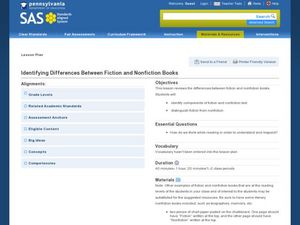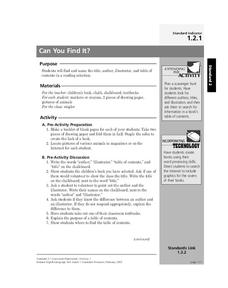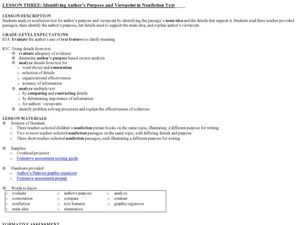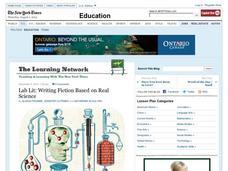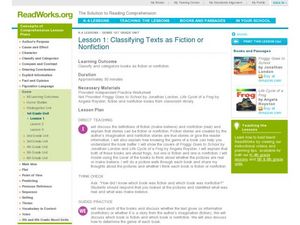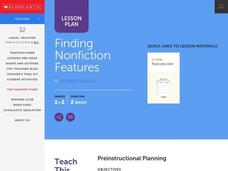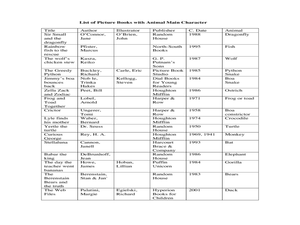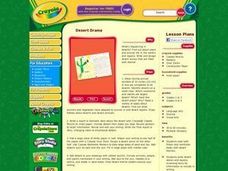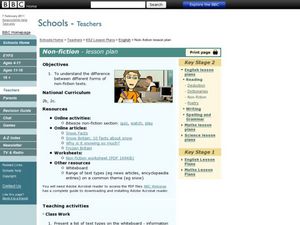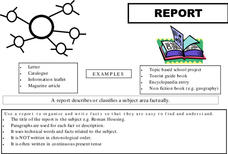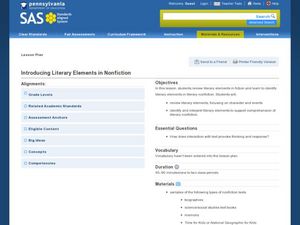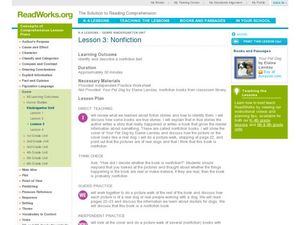Curated OER
Fiction vs. Nonfiction
Students find the difference between fiction and nonfiction. In this fiction/nonfiction lesson, 1st graders read the story Johnny Appleseed and discuss what makes this a nonfiction story. They listen to a fiction story and see what...
Curated OER
Identifying Differences Between Fiction and Nonfiction Books
Students explore the differences between fiction and non-fiction book. In this genre study lesson, students read examples of fiction and non-fiction and identify the characteristics of each genre. Students list the characteristics on a...
Curated OER
Comparing and Contrasting Fiction and Nonfiction Using Graphic Organizers
Students compare and contrast fiction and non-fiction selections. In this writing skills lesson, students use different forms of graphic organizers to compare "The Three Little Pigs," to Wiesel's Night.
Curated OER
Can You Find It?
Plan a Parts of a Book scavenger hunt. Begin by giving your young adventurers a book, and asking them to find the title, author, illustrator, and table of contents. After a discussion of the purpose of each of these items, class members...
Curated OER
Identifying Author’s Purpose and Viewpoint in Nonfiction Text
Why do people write books? Pupils discover how to identify the author's viewpoint. They read non-fiction passages their instructor selects (the plan has the class look at nonfiction children's picture books), and then identify the...
Curated OER
Lesson Plan 3: Great Book, Gross Book
It's time for your scholars to become book reviewers! Start with a fun review of foods: are they good or gross? Learners apply these evaluation techniques to books, recording their thoughts on large pieces of butcher paper. Simply have...
The New York Times
Writing Fiction Based on Real Science - NYTimes.com
Refuse to alienate your scientific-minded young scholars during your creative writing unit. Learners explore how literary writing can reflect observable fact, and be based in actual science. The links include examples of fiction and...
Curated OER
Lesson 1: Classifying Texts as Fiction or Nonfiction
First graders characterize fiction and non-fiction books, they discover the characteristics of each type of book and compare two books (one fiction & one nonfiction) about the same subject. They make a list that describes what makes...
Curated OER
Non-fiction Book Report
In this book report worksheet, young scholars fill in information about a nonfiction book. Students include the topic, 4-5 facts already know, 6 new words learned, and 5-6 things they learned about the topic. Young scholars also write...
Curated OER
Finding Nonfiction Features
Students review the differences between a fiction and non-fiction book. In groups, they use different non-fiction books to identify the eleven features that distinguish it from a fiction book. To end the lesson, they create a chart...
Curated OER
Fiction and Nonfiction
Fourth graders differentiate between fiction and nonfiction using the books "Sarah Plain and Tall" and "A Day in the Prairie." They develop a list of information that they learn from the text, and create an information web. Students...
Curated OER
Using Details From The Text
Begin this expository writing activity by reading a non-fiction book of your choice and modeling expository writing. The plan suggests The Trip of a Drip by Vicki Cobb but notes that other texts will work. Learners then choose a...
Curated OER
Very Good Facts About Very Good Books
Learners identify the characteristics of fiction and non-fiction texts. In this genre study lesson, students read the books A Butterfly Alphabet Book and I Wish I Were a Butterfly. Learners develop a graphic organizer to compare and...
Curated OER
Lesson 2: Fiction
What makes a book fiction or nonfiction? Kindergartners discover ways to find out if a book is real or made up. They examine a fictional picture book as a group and decide what clues help them decide. There is an independent worksheet...
Curated OER
Find an Animal! Find a Book!
Young scholars identify the themes of different books by classifying their genre. In this genre lesson, students examine a specific animal by reading both a nonfiction and fiction book about the species. Young scholars compare the...
K20 LEARN
Bear Tale: Author's Purpose - Informing Or Entertaining
After reading The Mitten by Jan Brett, scholars discuss the author's purpose. Small groups compare and contrast a book written to entertain and a book to inform, then create a T-Chart detailing the characteristics of each. Learners...
Utah Education Network (UEN)
Know Your Literature Genres
Open the library for young readers by introducing them to the main genres and sub-genres. A podcast and two presentations identify the characteristics of the different genres. Groups then sort through a box of books and, using evidence...
Curated OER
Desert Drama
Young scholars read both fiction and nonfiction books with desert themes. Then they write desert stories and reports, reviewing texts for information to include in writing. Students also design desert scenes with details and setting...
Curated OER
Non-Fiction Texts
Third graders examine different types of non-fiction texts. In this non fiction lesson, 3rd graders use different types of texts to gather information. Students work in groups to analyze the texts for author's purpose, common themes, and...
Curated OER
Writing a Book Review - Non-Fiction
Fifth graders write a book review for a nonfiction book. In this response to literature lesson, 5th graders read a nonfiction book and write a review that gets others interested in reading the book without giving too much away. The...
Curated OER
Non Fiction Posters
A set of very useful posters (in PDF) describing different types of non-fiction texts is here for you. While there isn't an activity, per se, in these worksheets, they could be used as a handy reference for learners who are engaging in...
Curated OER
Introducing Literacy Elements in Nonfiction
Explore nonfiction writing with your class. They will identify elements in nonfiction by reviewing elements of fiction. Then they use biographies, memoirs, menus, Time for Kids, and text books to identify elements of nonfiction. They...
Curated OER
Lesson 3: Nonfiction
Introduce young readers to the word of non-fiction. They examine the features found in non-fiction books such as, facts, dates, and realistic pictures. They discuss how the images in the book Your Pet Dog depict real dogs doing real...
Curated OER
Distinguishing Fiction and Non Fiction
Have your class go on picture walks of different books, and identify them as either fiction or non fiction and why. Working in groups, kindergartners state whether the book tells information or comes from the author's imagination. Use...



